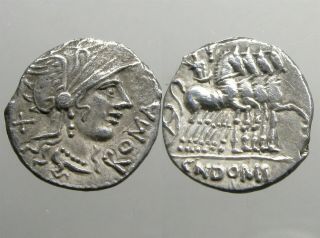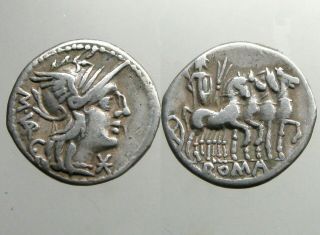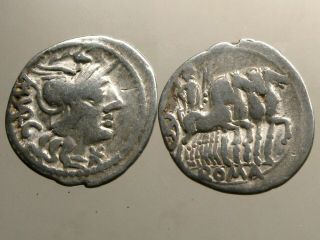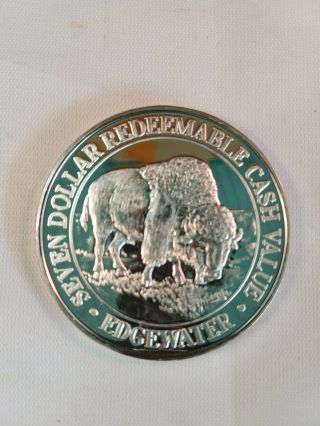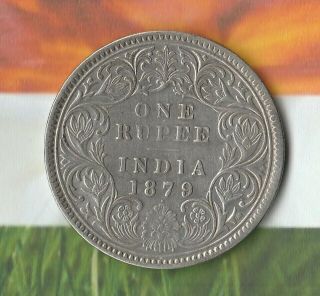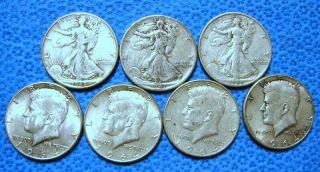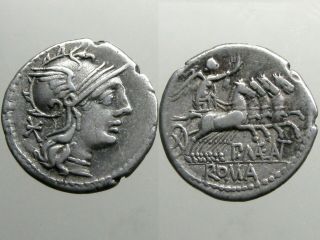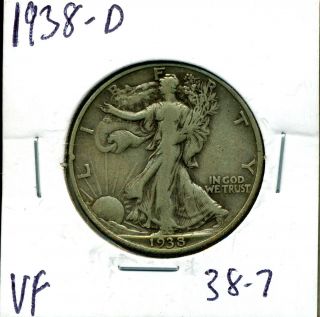DOMITIA 7 SILVER DENARIUS_Roman Republic_JUPITER IN WALKING QUADRIGA
Item History & Price
| Reference Number: Avaluer:9881265 |
17C130 FRASCATIUS ANCIENTSA BEAUTIFUL ROMAN REPUBLIC SILVER DENARIUS OF DOMITIUS AHENOBARBUS FROM 116 - 115 BC. It may be that this moneyer was the Consul of 96 BC THE SIZE IS 20.0 MM AND 3.80 GRAMS. Syd 535a Sear 161 Craw 285/1OBVERSE – Helmeted head of Roma right, X behind, ROMA beforeREVERSE – Jupiter in walking quadriga right, holding branch and thunderbolt, CN.DOMI in exergueTHE ROMAN REP...UBLIC DENARIUSThe denarius is said to have been one day’s pay for a Roman soldier. The coins were hand struck from hand cut dies.The first Roman Republic denarius was struck in 211 BC. It was made from silver the Romans captured when they sacked Syracuse a year before. At first, the denarius weighed a little more than 4 grams, though its weight declined over timeDesigns and legends were controlled by a triumvirate of mint officers called “moneyers”. The post of moneyer was a political appointment in Rome. Moneyers were permitted to use coin designs and inscriptions for self promotion. The typical Roman denarius will have the moneyer’s name, and some evidence of his lineage via other design elements of the coin.HISTORY OF THE ROMAN REPUBLICAfter the deposal of the last Etruscan king, in 509-10 BC, Rome abolished her regal system and instituted a new political order, the Republic. The king was replaced by two consuls and a range of lesser magistrates, elected annually by the whole male citizen body. The consuls chose an advisory council, the Senate, at first ad hoc, later according to well-defined qualifications (of landed wealth, military and political service).The consuls led the army in times of war and had executive powers in most others matters. Army service was a duty of citizenship but it was also a privilege for which only the wealthier (who could supply their own equipment) were eligible. Soon a small group of aristocratic families, the patricians, managed to gain a virtual monopoly on the consulship and most other civic and priestly offices till the late 5th century BC, when the plebeians formed their own alternative state within the state and fought successfully in the course of the 4th century to win equal rights. A large part of the solution relied on further territorial expansion, to acquire more land which was then allocated among the plebeians. The first city conquered was Veii, a major Etruscan rival a few kilometers north of Rome on the other side of the Tiber, in 396 BC. After Veii Roman armies moved against the rest of Latium and up into the mountains of Samnium, making treaties by threat or outright war until the whole of central Italy was under Roman control. The last Greek stronghold at Taranto was captured in 272 BC. Once started, the process of conquest was difficult to arrest. Rome's way to obtain and maintain power in Italy had been to make her enemies into allies and co-opt with them into her own military machine, offering them a share of the booty in return for more fighting men to go on more campaigns. After peninsular Italy, the next step was to move over to Sicily in 264 BC, which brought a series of wars with Carthage (near modern Tunis), whose great trading empire ranged from the coast of North Africa over western Sicily, Sardinia, and southern Spain. The three wars between Rome and her rival are known as the Three Punic Wars (265 BC, 219 BC, 149 BC) and ended in 149 BC with the destruction of Carthage, razed and covered with salt. During this century of wars Rome notably extended its domination eventually assuming the role of capital of the Mediterranean. By the 1st century BC Rome had the control over Spain, North Africa, the Balkans, Greece, most of the Aegean, and large parts of Asia Minor and central North Africa. After the victorious campaigns, Rome had to learn to administer its conquests. At the beginning the task was very hard because Rome had virtually no bureaucracy, and the Romans preferred not to expand their administrative apparatus. Rome initially used to establish alliances with foreign states and cities or to annex them as provinces governed governor, annually elected by the Roman senate, who held the civil and military authority of that province. Their absolute power led many of them to overlook extortion by tax collectors and to commit bribery. The corruption was not effectively prosecuted since the courts showed a strong bias towards the senatorial class. The Roman statesman Cato the Elder's sour prediction that foreign conquest would corrupt Rome itself proved all to be true. A True Auction Environment – Auctions start at $.99 with No Minimums and No Reserves. FULL UNCONDITIONAL GUARANTEE OF AUTHENTICITYIf the buyer feels that the coin received is not as represented - just return the coin and the buyer will be fully reimbursed for the cost of the coin; the original shipping charge; and the cost to ship the coin back… No Questions Asked. If the buyer is not happy, please let me know, and I will do what I can to make it right. NOTE: Frascatius is a life member (LM #6864) of the American Numismatic Association (ANA). Frascatius fully complies with the ANA Member Code of Ethics. If you have any questions regarding this auction, please click on “Ask seller a question”. I will be more than happy to provide you with a response. Visit My eBay Store: Frascatius Ancient Coins For those new to ancient coins, please contact me, and I will e-mail to you my "Beginners Guide for Ancient Coin Collectors - FAQ". SHIPPING:To the U.S. = $3.00 Insured Flat RateInternational = $4.50 Insured Flat Rate Multiple items may be grouped at no additional charge at the above rates. All items will be carefully packaged, protected & insured (private insurance).
00169
00169




